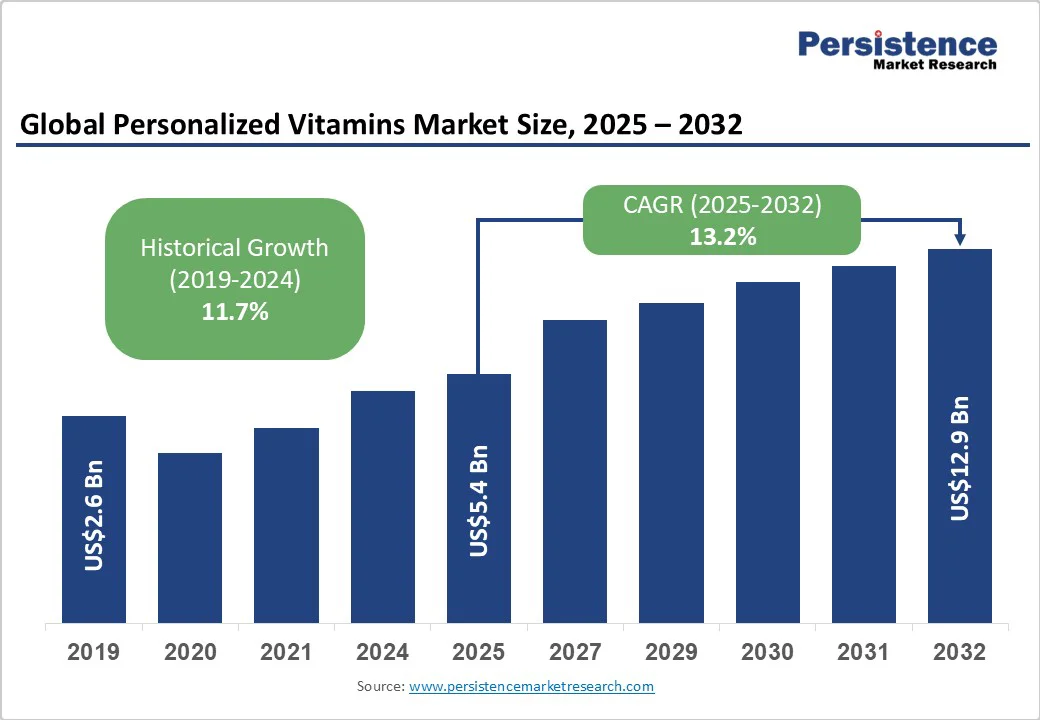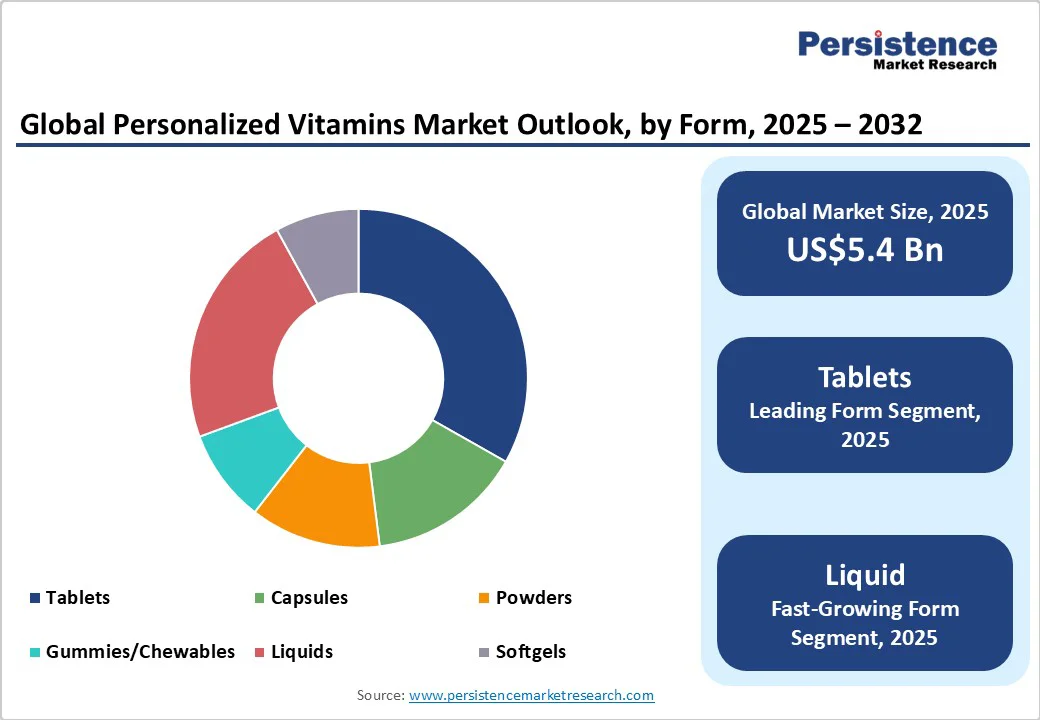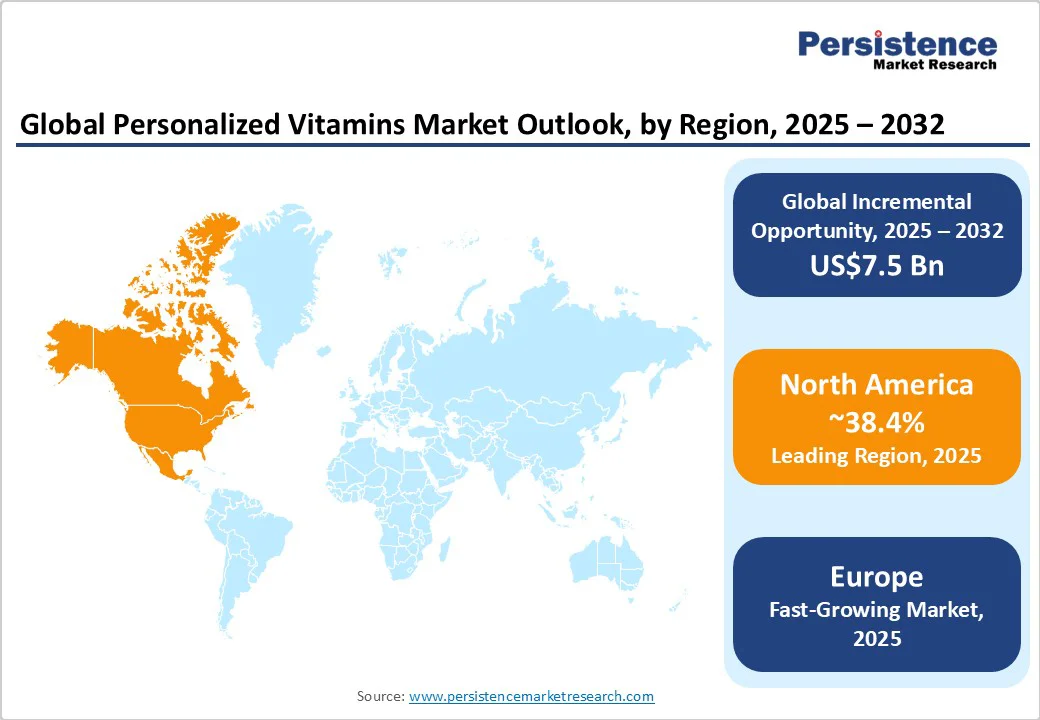ID: PMRREP35694| 178 Pages | 8 Oct 2025 | Format: PDF, Excel, PPT* | Food and Beverages

The global personalized vitamins market size is likely to be valued at US$5.4 Billion in 2025 and is estimated to reach US$12.9 Billion in 2032, growing at a CAGR of 13.2% during the forecast period 2025 - 2032, driven by increasing consumer demand for tailored nutrition solutions that address individual health requirements, deficiencies, and wellness goals.
| Key Insights | Details |
|---|---|
| Personalized Vitamins Market Size (2025E) | US$5.4 Billion |
| Market Value Forecast (2032F) | US$12.9 Billion |
| Projected Growth (CAGR 2025 to 2032) | 13.2% |
| Historical Market Growth (CAGR 2019 to 2024) | 11.7% |

A key driver of growth is the rising consumer focus on customized nutrition that addresses specific deficiencies and health objectives. People are increasingly aware that generic multivitamins may not meet their unique requirements, prompting interest in formulations based on blood tests, DNA analysis, or lifestyle profiling.
For example, Baze in North America delivers at-home blood testing to identify nutrient gaps. This demand is fueled by consumers’ desire for measurable outcomes and data-backed wellness solutions. It is making personalized vitamins a preferred choice for those seeking precision health interventions rather than one-size-fits-all options.
Another growth driver is the convenience delivered by subscription-based monthly delivery and individually packaged doses. Personalized vitamins are often organized into daily packs, capsules, or sachets, which simplify adherence and reduce the chance of missed doses.
Brands now use color-coded, pre-portioned packets that integrate smoothly into daily routines, appealing to busy adults who prioritize convenience. This model also supports expansion plans for companies, as automated fulfillment systems handle individualized formulations while maintaining consistent quality.
One major restraint is the prevalence of exaggerated or unverified health claims. Some brands market supplements as solutions for disease prevention or treatment without sufficient clinical evidence, which can mislead consumers and erode trust in the product.
Regulatory authorities, including the FDA in the U.S. and EFSA in Europe, have increased scrutiny on such claims, issuing warnings or fines to non-compliant companies. For example, several start-ups providing DNA-based vitamin packs have faced criticism for overstating the impact of personalization on long-term health outcomes.
Another challenge is the potential for overconsumption of vitamins, which can lead to toxicity or adverse health effects. Personalized supplements, when misused or combined with other over-the-counter products, tend to result in excessive levels of fat-soluble vitamins such as A, D, E, and K, or minerals, including iron.
For instance, cases of vitamin D toxicity have been reported in users who combined personalized packs with high-dose independent supplements. This risk limits consumer adoption and prompts strict regulations, compelling brands to implement robust dosage algorithms, clinical oversight, and educational support.
One of the most promising growth opportunities lies in integrating digital health tools such as DNA testing, blood biomarker analysis, and lifestyle tracking. These tools allow brands to go beyond basic questionnaires and deliver scientifically validated supplement recommendations that comply with individual physiology.
Companies such as Rootine combine DNA and blood tests with microbead capsules to provide highly personalized formulations, while Baze uses at-home blood testing to identify specific nutrient deficiencies. By using these technologies, brands can build superior consumer trust, improve adherence, and create subscription models with high retention.
Developments in nanotechnology present a key opportunity to improve the effectiveness of personalized vitamins by refining nutrient bioavailability. Nano-encapsulation allows vitamins and minerals to be delivered in small and easily absorbed particles, ensuring that the body utilizes a high percentage of the nutrients consumed.
Brands experimenting with this technology can provide formulations that target specific tissues or release nutrients gradually for sustained benefits. For instance, some Europe-based start-ups are exploring nanoemulsion-based vitamin supplements to increase absorption of fat-soluble nutrients such as vitamin D and omega-3 fatty acids.
Tablets are predicted to account for a market share of approximately 33.2% in 2025, as they are easy to dose, store, and deliver in subscription packs. They allow manufacturers to combine multiple nutrients into a single daily pill, which simplifies personalization without raising production costs. Several renowned brands rely on tablet formats as they are compatible with automated packaging systems used for customized daily packs.
Liquid is poised to be the fastest-growing segment in 2025 owing to better bioavailability. Liquid vitamins also appeal to consumers with swallowing difficulties, such as children and older adults. Brands such as MyVitamins have introduced liquid multivitamin shots customized to individual requirements.
The rise of functional beverages and on-the-go wellness trends has also blurred the line between supplements and nutritional drinks. This has pushed various brands to launch liquid-based personalized options.
Disease-based supplements are speculated to hold nearly 70.6% of the market share in 2025, as consumers are demanding targeted interventions for specific health conditions such as diabetes, cardiovascular issues, or vitamin deficiencies.
These supplements are often backed by clinical research or biomarker testing, which builds trust. In China, for example, disease-targeted personalized vitamins are the most prominent category in Asia Pacific, addressing nutrient deficiencies linked to chronic illnesses.
Wellness supplements are expected to see steady growth in the foreseeable future because consumers focus on preventive health and well-being rather than treating a condition. This includes vitamins for immunity, energy, skin health, and mental clarity.
Nordic start-ups, such as Alba Health, emphasize clean-label and plant-based wellness formulations to meet lifestyle-driven demand. The rise of daily vitamin subscriptions and wellness-focused e-commerce platforms has also supported this segment.
Adults are projected to account for about 50.3% of the market share in 2025, as they are health-conscious, financially independent, and digitally connected, making them receptive to subscription-based, data-driven wellness solutions.
Many adults are looking to optimize energy, immunity, and stress management, which caters to customized supplement lines. Various brands have designed their algorithms specifically around adult lifestyles, combining lifestyle quizzes, dietary assessments, and occasional biomarker testing to deliver personalized vitamin packs.
The geriatric segment is envisaged to exhibit a considerable CAGR through 2032, backed by age-related nutrient deficiencies, declining bone density, cognitive health concerns, and chronic conditions that require targeted supplementation.
Older adults are now adopting personalized vitamins to maintain quality of life and prevent complications. In Japan, multiple microbiome-focused supplements target gut health and bone strength in older populations, providing formulations customized to geriatric nutritional requirements.

In 2025, North America will likely account for approximately 38.4% of the market share, as it is highly developed and technology-driven, with most innovations emerging from the U.S. Companies are using DNA, blood, and lifestyle data to create customized supplement plans, moving beyond basic online quizzes. Consumers are increasingly aware of nutrient deficiencies and prefer vitamins that match their unique health profiles. This shift has made personalization a key differentiator for supplement brands.
Regulatory scrutiny in the U.S. has also intensified, with the Food and Drug Administration (FDA) and the Federal Trade Commission (FTC) keeping a close watch on misleading health claims in supplements. This has pushed brands to invest in clinical validation and transparent ingredient sourcing to build trust. In addition, consumers in North America now value guidance from registered dietitians or telehealth integration, prompting brands such as Baze and HUM Nutrition to deliver expert consultations alongside their products.
In Europe, the market is evolving with a strong focus on science-backed formulations and regulatory compliance. Unlike the U.S., where personalization often begins with lifestyle quizzes, Europe-based companies emphasize genetic and biomarker-based customization supported by clinical evidence.
This reflects the region’s strict health-claim regulations set by the European Food Safety Authority (EFSA), which only approves claims with proven efficacy. Owing to these rules, brands in the region rely more on credible testing and ingredient transparency than on bold marketing.
Countries such as Germany, the U.K., and the Netherlands are at the forefront of adoption. In Germany, companies, including Novogenia, provide genetic and blood-based testing to create personalized supplements. In the U.K., digital-first brands are building subscription models that deliver customized daily vitamin packs. Many of these companies emphasize plant-based, allergen-free, and sustainably sourced ingredients, catering to Europe’s high demand for clean-label and eco-conscious products.
The market in Asia Pacific is expanding at a fast pace as consumers become more health-conscious and tech-savvy. China, Japan, India, and South Korea are leading in terms of adoption due to surging awareness of preventive healthcare and a rise in chronic conditions such as diabetes and vitamin deficiencies.
In China, companies are using AI and genetic data to develop vitamins customized to individual health conditions. Japan is focusing on microbiome-based formulations that combine traditional fermented ingredients with modern nutrition science to support gut and metabolic health.
Global players are also strengthening their presence in Asia Pacific through localized innovation. Amway, for example, has opened research hubs in Singapore and China to develop personalized supplements that match Asian diets and lifestyles rather than simply adapting Western formulas. Start-ups in India and South Korea are using at-home testing kits for DNA or blood profiling to recommend nutrient plans, though high costs and regulatory barriers still limit mass adoption.

The global personalized vitamins market is constantly evolving as both start-ups and established players fight for a share. Direct-to-consumer brands such as Care/of, Persona Nutrition, Rootine, Baze, and Nourished dominate the online space with subscription-based models that customize supplements through lifestyle quizzes, DNA tests, or blood biomarkers.
Large companies are now entering the market through acquisitions and partnerships to remain competitive. For instance, Nestlé Health Science acquired Persona Nutrition and HUM Nutrition, expanding its reach into personalized wellness.
Leading players in the field of personalized vitamins focus on innovation through DNA and blood-based customization, cost leadership via subscription efficiency, and market expansion through retail and telehealth partnerships. Key differentiators include clinically backed formulations, AI-driven personalization, and sustainable packaging. Emerging trends involve hybrid models combining digital diagnostics, nutrition coaching, and data-driven supplement delivery.
The personalized vitamins market is projected to reach US$5.4 Billion in 2025.
Rising demand for nutrient-targeted supplements and convenient subscription-based delivery models is the key market driver.
The personalized vitamins market is poised to witness a CAGR of 13.2% from 2025 to 2032.
Growth of microbiome-based formulations and the launch of clean-label ingredients are the key market opportunities.
Abbott Laboratories, Amway Corporation, and Herbalife Nutrition are a few key market players.
| Report Attribute | Details |
|---|---|
| Historical Data/Actuals | 2019 - 2024 |
| Forecast Period | 2025 - 2032 |
| Market Analysis | Value: US$ Bn |
| Geographical Coverage |
|
| Segmental Coverage |
|
| Competitive Analysis |
|
| Report Highlights |
|
By Form
By Application
By Age Group
By Distribution Channel
By Region
Delivery Timelines
For more information on this report and its delivery timelines please get in touch with our sales team.
About Author